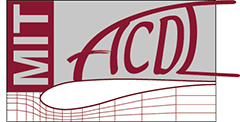-----------------------------------------------------
"Riemannian Multifidelity Covariance Estimation from Statistically Coupled Observations" Aimee Maurais
Abstract: In this work we present a multifidelity covariance estimator defined as the solution to a regression problem on a manifold of symmetric positive definite (SPD) matrices. Given a set of high- and low-fidelity sample covariance matrices, viewed as a sample of a product-manifold-valued random variable, we estimate the underlying true covariance matrices by minimizing a notion of squared Mahalanobis distance between the data and a model for its variation about its mean. This regression estimator can be employed using any geometry for the SPD manifold and reduces to control variates in the chosen geometry when the low-fidelity optimization variables are fixed. We particularly focus on the affine-invariant SPD manifold geometry, under which multifidelity covariance regression estimates are guaranteeably positive definite and the Mahalanobis distance has desirable properties. We demonstrate our estimator’s performance in a simple numerical example, showing that it can provide significant reductions in MSE relative to single-fidelity covariance estimators.
-----------------------------------------------------
"Approximating Triangular Transport Maps for Bayesian Inference" Daniel Sharp
Abstract: Many methods exist for quantifying uncertainty in physical applications, often via generative sampling or density approximation. A flexible solution is to use measure transport methods to connect this uncertainty in applications with well-understood distributions. In our work we specifically consider monotone triangular transport maps, which structurally impose appealing analytical and computational properties, as tools for distribution approximation. Employing these transport maps gives direct access to marginal conditionals of the target distribution, which arise as fundamental objects in Bayesian inference. In this presentation we discuss numerical techniques for approximating triangular transport maps, give corresponding functional approximation results, show connections to traditional techniques such as quadrature, and demonstrate an application to simple Bayesian sequential parameter estimation.

